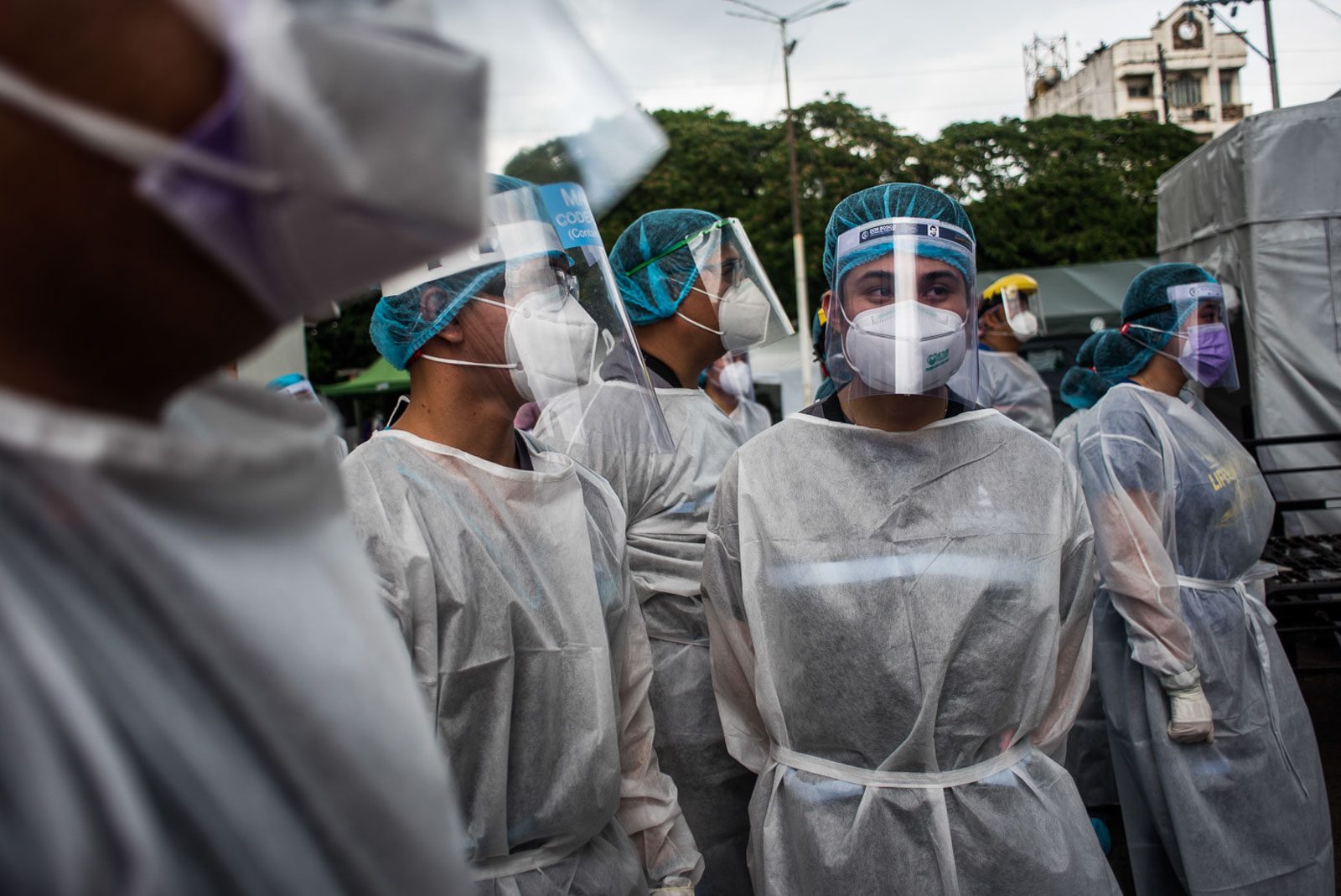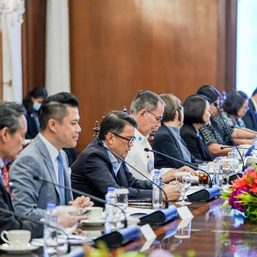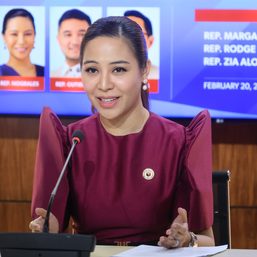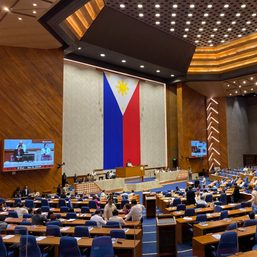SUMMARY
This is AI generated summarization, which may have errors. For context, always refer to the full article.

The House of Representatives is one step away from passing a bill on the country’s coronavirus response and recovery plan, which includes a P162-billion standby fund valid until the end of 2020.
On Wednesday, August 5, lawmakers approved the amended version of House Bill No. 6953 or the “Bayanihan to Recover as One Act” on second reading through viva voce voting or a vote of ayes and nays.
This means the bill – which was among the 21 priority measures identified by President Rodrigo Duterte in his 5th State of the Nation Address – needs to go through a 3rd and final reading before hurdling the House.
But there’s still long way to go before Bayanihan 2 becomes a law.
While senators already passed their version on 3rd reading, they are proposing a standby fund for COVID-19 worth only P140 billion. The House sets the amount much higher at P162 billion, to be sourced primarily from off-budget government savings and tax collections.
Senators also set the expiry of their Bayanihan 2 bill on September 30, while representatives want the proposed law to be valid until December 31.
The chambers need to thresh out the conflicting provisions between their respective bills to be able to send a reconciled version to Malacañang for the President’s signature.
HB 6953 provides a comprehensive list of 64 “interventions” that the executive branch is expected to undertake to combat the pandemic. These include setting a COVID-19 testing protocol for vulnerable sectors, as well as providing aid to those in the transport and tourism industries critically affected by the health crisis.
The 64 interventions adopted the 30 special powers that the first Bayanihan law originally granted to Duterte, though provisions that would impose jail time on violators have been deleted.
The Duterte government has been heavily criticized for its response to the COVID-19 crisis, with cases of infections totalling 115,980 as of Wednesday.
On August 2, Duterte reverted Metro Manila, Laguna, Cavite, Rizal, and Bulacan to modified enhanced community quarantine from August 4 to 18 after medical professionals warned him that the country was on the brink of losing its battle against the pandemic.
Subsidies for the poor, displaced workers, students
Just like the Senate version, HB 6953 would provide a one-month emergency subsidy to qualified low-income households who were not able to avail themselves of the first tranche of cash aid granted to 18 million families.
The bill would also direct government financial institutions to provide loans, subsidies, discounts, and grants for the purchase of electronic gadgets as schools shift to distance learning.
Displaced workers – including probationary, contractual, and casual workers – would also be given unemployment or involuntary separation assistance worth P10,000. Teaching and non-teaching personnel would also be granted a one-time cash assistance worth P10,000.
Students who are not receiving any educational subsidy from the government but who are now facing financial difficulties due to the pandemic would also receive tuition subsidy.
The Bayanihan 2 bill would continue pushing for the COVID-19 testing of vulnerable sectors currently prioritized by the Department of Health through the real-time reverse transcription polymerase chain reaction (RT-PCR) testing method.
With the government still struggling with contact tracing, HB 6953 would allow the government to tap the following as as additional barangay health workers: parent-leaders from the Pantawid Pamilyang Pilipino Program and members of accredited civil society organizations.
Funding the COVID-19 response
The House version of Bayanihan 2 allots P162 billion for the country’s standby COVID-19 response fund, broken down as follows:
- P10 billion: Subsidy to the National Health Insurance Program of the Philippine Health Insurance Corporation for the country’s expanded COVID-19 testing capacity
- P10.5 billion: For hiring of additional healthcare workers, arrangements for their risk allowance, life insurance, compensation, and compensation for death and critical illness
- P3 billion: Purchase of personal protective equipment sets for frontliners and indigents
- P4 billion: Construction of quarantine facilities
- P20 billion: Cash-for-work-programs
- P51 billion: Infusion of new capital for government financial institutions
- P20 billion: Low-interest credit for the agriculture sector
- P 10 billion: Department of Transportation’s assistance to critically impacted businesses in the transport industry
- P10 billion: Financing for the programs of the Tourism Infrastructure and Enterprise Zone Authority
- P100 million: Fund for training and subsidies for tourist guides
- P3 billion: Assistance to state universities and colleges (SUCs) to develop smart and IT-ready facilities
- P600 million: Subsidies for qualified students in both public and private elementary, secondary, and tertiary educational institutions
- P300 million: Subsidies for teaching and non-teaching personnel in both public and private elementary, secondary, and tertiary educational institutions
- P1 billion: Funding for the subsidy programs of the Department of Social Welfare and Development
- P4 billion: Assistance to the Department of Education to prepare schools for digital education
- P1.5 billion: Assistance to local government units
- P180 million: Allowances for national athletes and coaches whose allowances were reduced by half during the pandemic
- P820 million: Additional funds for the Department of Foreign Affairs’ porgrams for displaced migrant workers
Much of the proposed P162-billion fund would be sourced from the unprogrammed funds and savings under the P4.1-trillion budget of 2020. This will be augmented by savings pooled from the previous Bayanihan law as well as all funds and investments held by any government-owned or -controlled corporation or national government agency.
The proposed Bayanihan 2 law would also be funded using excess and new revenue collections, the 5% franchise tax on gaming earnings, and all applicable taxes imposed on offshore gaming operators and service providers. – Rappler.com
Add a comment
How does this make you feel?


![[Time Trowel] Evolution and the sneakiness of COVID](https://www.rappler.com/tachyon/2024/02/tl-evolution-covid.jpg?resize=257%2C257&crop=455px%2C0px%2C1080px%2C1080px)




![[OPINION] The First Mode conundrum](https://www.rappler.com/tachyon/2024/03/tl-first-mode-conundrum-03232024.jpg?resize=257%2C257&crop=283px%2C0px%2C720px%2C720px)


There are no comments yet. Add your comment to start the conversation.